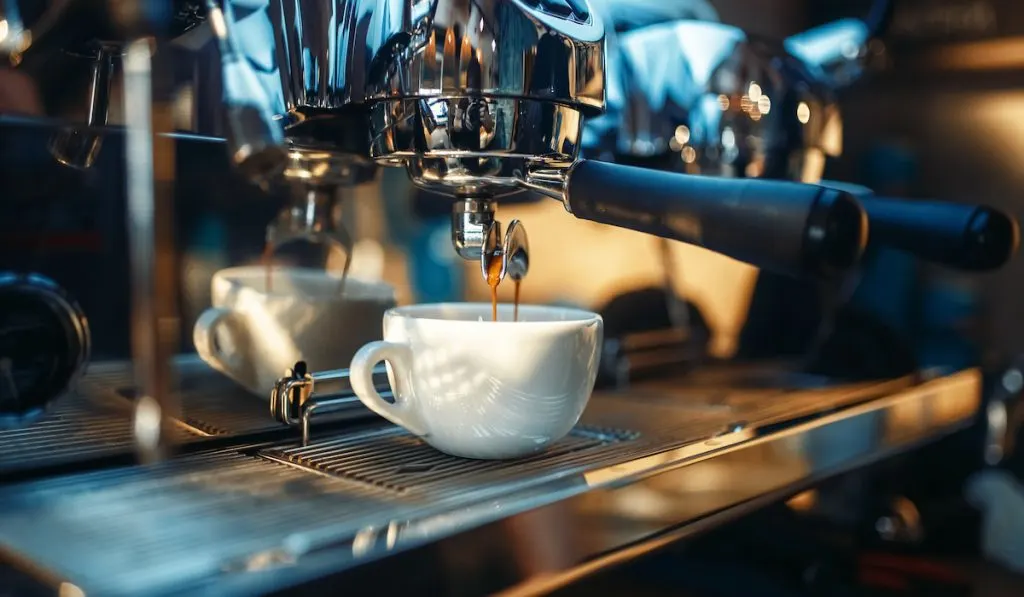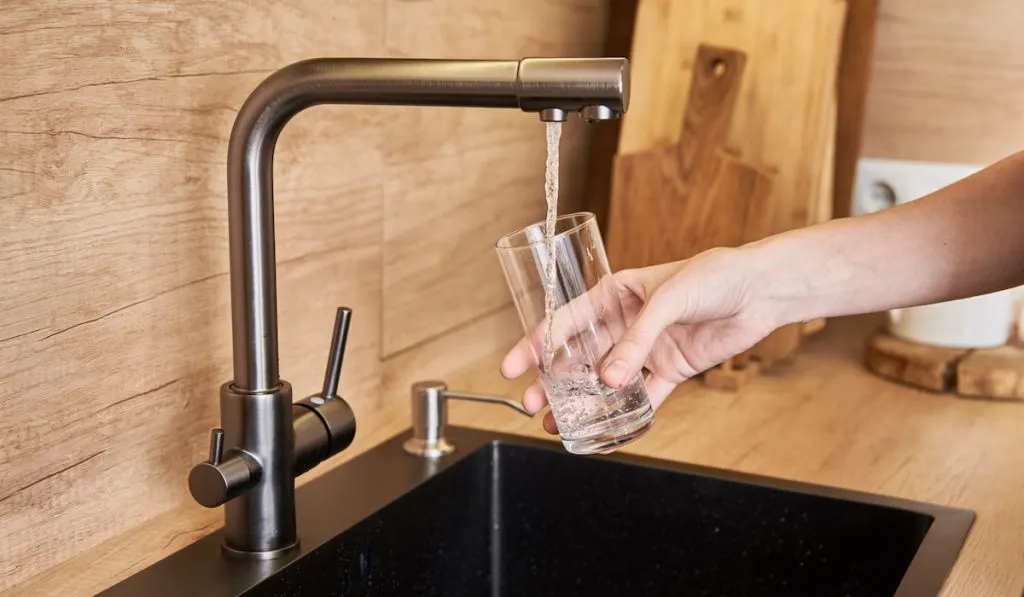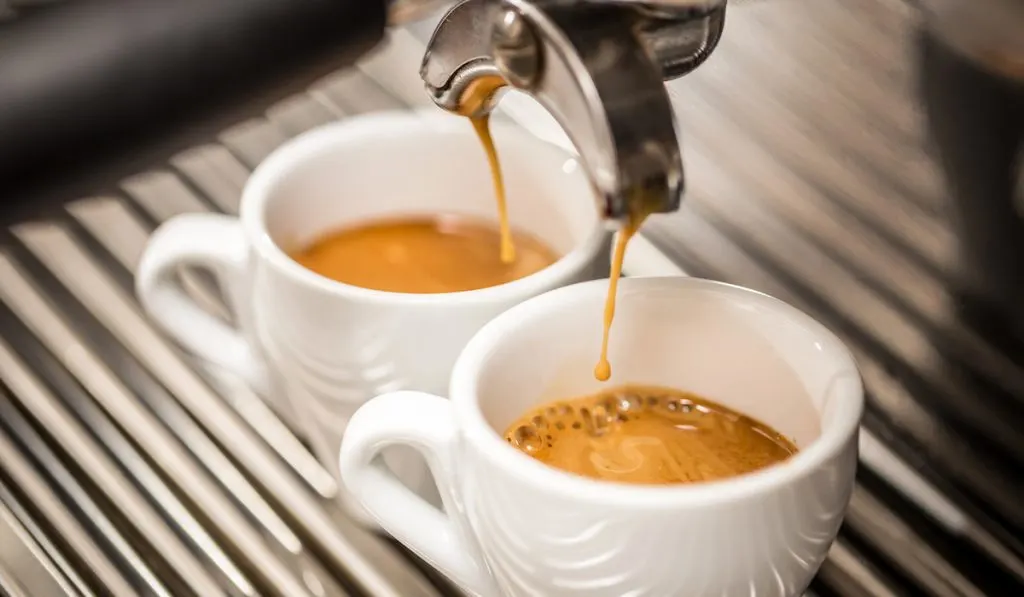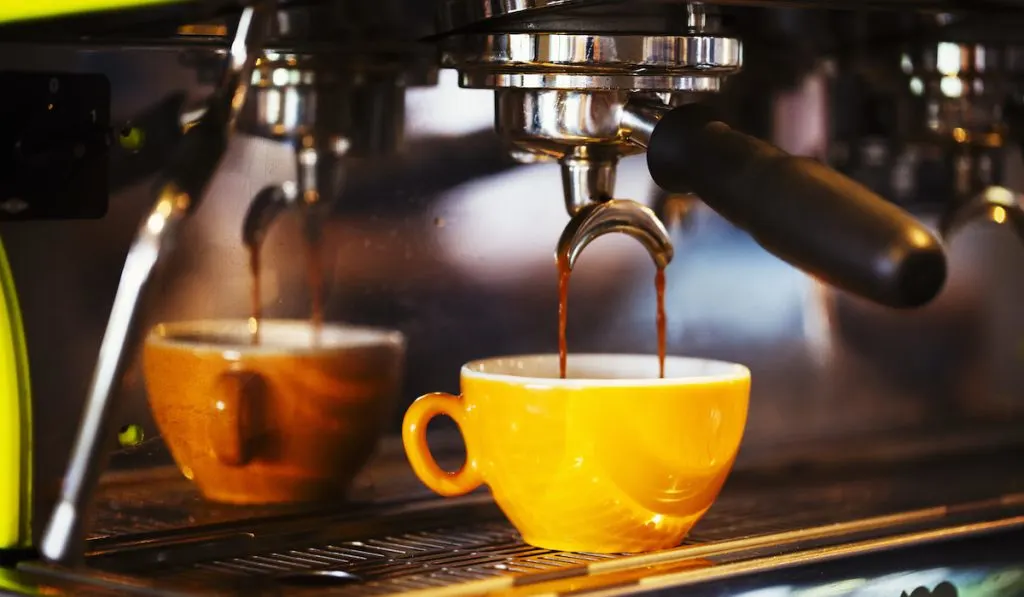Many espresso machines tend to have issues caused by poor water quality. It is something often overlooked by espresso machine owners.
Finding the best type of water for your espresso machine does not have to be a difficult task, though. All you need is clean filtered water that has just enough but not too much mineral content.

To find out the best water for your machine, you need a water hardness or TDS meter test. These test strips enable you to measure the hardness level of your water. If the measurement obtained is above 5 grains per gallon (GPG) or 85 parts per million (PPM), you need a water softener.
To get the right taste for your espresso, some mineral content in the water is necessary. These minerals are also essential to ensure your machine works to avoid overfilling the boilers.
A reverse osmosis system will usually take out the mineral content of the water. But getting too many minerals out can cause problems as well. Several internal sensors in the machine require some mineral content.
As we run through the rest of this article, we discuss the types of water you should use in your espresso machine. We also discuss the effect of water on the espresso taste and lifespan of the espresso machine.
Should You Use Bottled Water?
Yes, you can use bottled water for your espresso machine. If the water in your home is hard, buying good bottled water can reduce the scale buildup in your espresso machine.
There are two types of bottled water: spring water and distilled water.
Spring water and distilled water will give your espresso different tastes and flavors.
Spring Water
Spring water has a relatively high mineral content, and it is bottled at the spring. The mineral content is one of the many reasons people prefer Fiji waters or Poland Springs.

Just like tap water, test your spring water to know the hardness level of the water. A descaling schedule is also required to ensure your espresso machine does not end up with an excess scale buildup.
Distilled Water
Distilled water has almost zero mineral content. With this level of mineral content, you will rarely ever have to descale the espresso machine.
Still, your espresso machine must be clean to ensure it does not develop any issues. Experts recommend that you descale twice a year when you use distilled water.
The upside to using distilled water is the flavor it gives your espresso, especially if the tap water in your area is not great.
Tap Water
Tap water is another good option for your espresso machine. If you reside in a major city, the water is cleaned but not ultra-purified. So, to clear out any large particles from the water, you may need to put it through a purifier or Brita.
Tap water will not cause too many issues for your machine. You may even prefer using tap water because you are accustomed to the mineral content of tap water. The mineral content also affects the flavor of your espresso. The amount of calcium or lime in the water pushes the coffee flavor out.
A shot of espresso made from the same beans in Houston, TX, and Rochester, NY, will have different tastes. The difference in taste is due to the difference in the mineral content of the water.
Although tap water does not cause machine problems, you still need to determine the water’s hardness.
This will help you determine how frequently you need to descale. Depending on your hardness scale, tap water should read between 1 and 3 grains per gallon or 50 parts per million.

One advantage of using tap water is that it gives your espresso a taste you are familiar with. The downside is that you have to make a proper schedule for descaling your machine.
Water From a Water Softener
A water softener replaces magnesium and calcium ions with sodium ions using ion-exchange technology. When you use softened water for your espresso, it will have a bland taste.
Using softened water will keep your machine running well with no scale-out. On its own, a water softener cannot remove chloramine or chlorine from water. Consequently, the oxidation power of chloramine and chlorine begins to damage the resin beads.
Does It Make a Difference in Taste?
When you make your espresso, you should know the mineral content of the water you decide to use. The water quality can sometimes enhance or detract from the flavor of your espresso.
When making espresso, water becomes much more than a tasteless liquid. The water you use becomes a medium for flavor.
While brewing, water extracts and absorbs the oils and solids the coffee beans contain. The presence or absence of some minerals influences this extraction process. Hence, the difference in taste.
Although the mineral content may enhance the water flavor, it may not translate to the espresso flavor or taste. The ideal espresso flavor is achieved with high-quality coffee beans and water with mild mineral content. The higher the mineral content in the water, the less it will take from the coffee beans.
At some point, there may be a mineral buildup on the inner surfaces of the espresso machine. Some of these surfaces include the internal tubes, portafilter, and boiler.
This mineral buildup may eat away at the inner parts of the espresso machine. It may also change the internal pressure of the espresso machine.
This, in turn, causes gaskets and internal pumps to become less effective. Consequently, the consistency of the extraction and taste of the espresso will change.
Mineral buildup is one factor that can severely damage an espresso machine.

Does It Matter for the Health and Longevity of the Machine?
Espresso machines are usually sturdy pieces of equipment. But you need to maintain them as well as you can.
The biggest threat to the health and longevity of an espresso machine is the quality of water used. Water causes scale buildup in the espresso machine, and this can become a problem later.
Scale buildup on probes can cause problems because the espresso machine relies on these probes for feedback. Therefore, you should check the hardness of your water before using it in your espresso machine.
Hard water leads to the accumulation of scale in the espresso machine. For this same reason, you should descale the machine regularly.
To reduce the rate of scale buildup, use clean spring water or a mixture of tap and distilled water.
Besides affecting probe feedback, the scale buildup will reduce your machine’s heating efficiency.
At the same time, the readings from the level and temperature probes will be inaccurate. The scales will also clog water passages and cause seal and valve failure, which could mess up your countertop.
The quality of water in wells and city water sources tends to change seasonally. So, ensure you check your water hardness every 3-4 months.
One way to improve the health/longevity of your machine is filtration. Filtration helps to eradicate solids like grit, rust, and any pieces of dirt from the water. Water filters also help to reduce chlorine content as well as other odors and tastes.
Your water may look clean, but there may still be some amounts of tiny particles in it. These can result in seals and clogged water passages. This is what filtration prevents.
Another way to ease the rate of scale buildup in your espresso machine is to soften the water. Water softening removes some of the minerals that cause hardness and the buildup of scale.
So, you will have less to worry about. In fact, espresso machines typically come with their own water softeners.

Filtration and water softening go a long way in prolonging the lifespan of your machine. However, they are not absolute.
The water softener may help prevent scale, but it is not always 100% accurate. Filtration may also get most of the impurities out, but it is not perfect.
Deposits may still accumulate over time. To this end, you should have your espresso machine serviced regularly. Servicing your espresso machine should be done at least every 6 months.
You may also visit your local service engineer to ensure the machine is in good working condition. While examining the espresso machine, the engineer will check the efficiency of the water softener. If it needs a replacement, they will let you know.
Final Take
The water you choose to use for your espresso machine not only affects the taste of your espresso but the health of the espresso machine.
You should always do a water hardness test to ensure the water you are using will not damage the espresso machine.
Resources
- https://clivecoffee.com/blogs/learn/the-importance-of-water-and-your-espresso-machine
- https://www.wholelattelove.com/blogs/articles/water-and-your-machine
- https://www.watertechonline.com/wastewater/article/15546881/treating-water-to-brew-the-perfect-cup-of-coffee
- https://www.liminicoffee.co.uk/espresso_machine_looking_after
